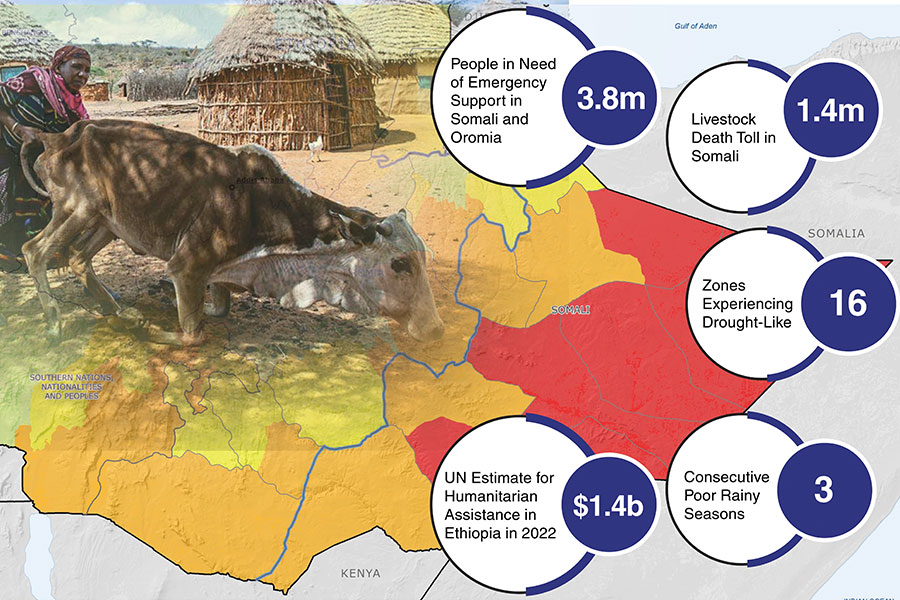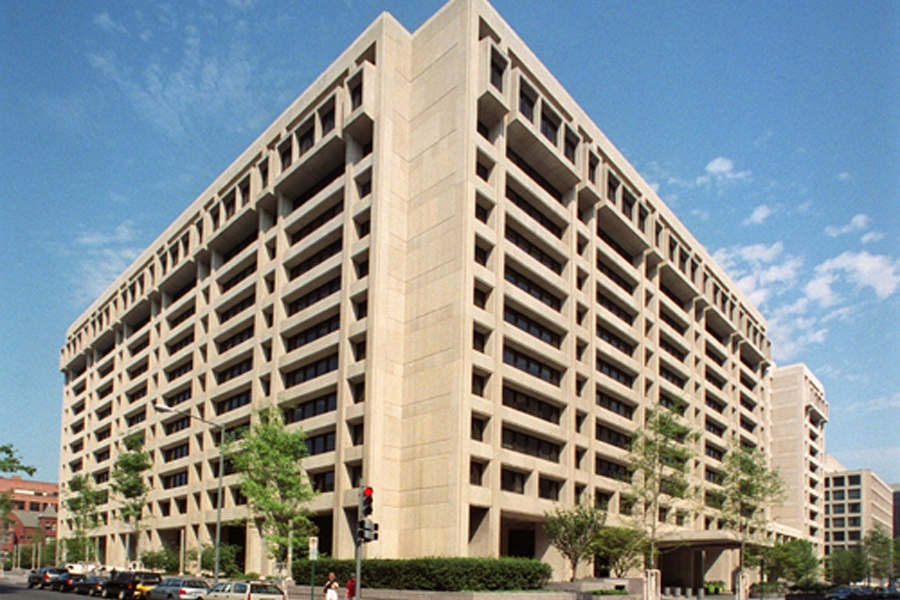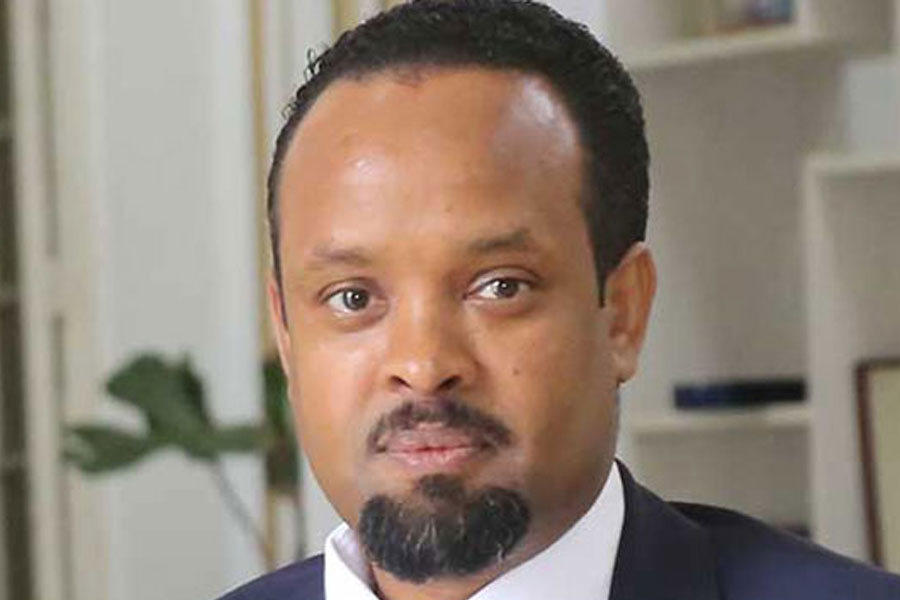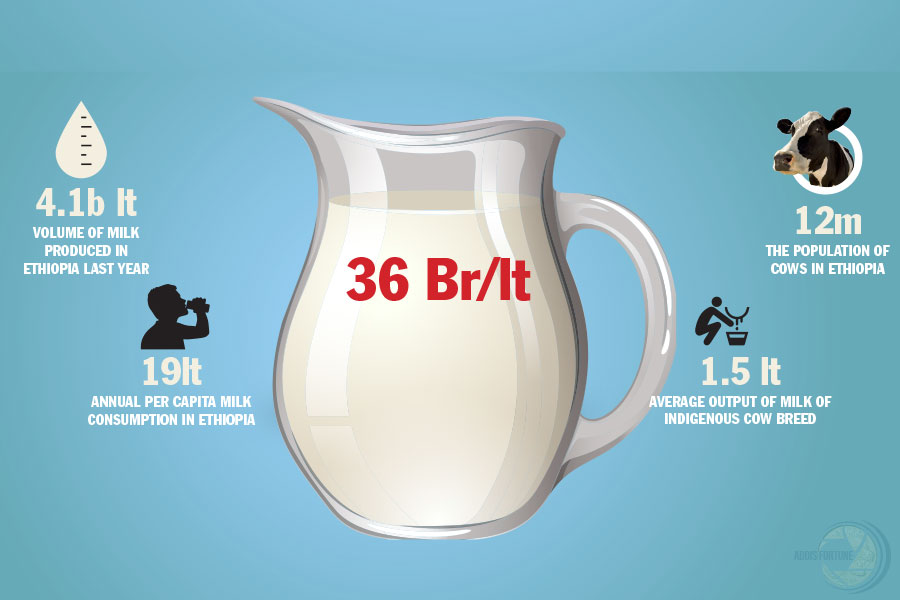
Radar | Aug 23,2025
As Ethiopia grapples with its escalating external debt, the arrival of an International Monetary Fund (IMF) team in Addis Abeba earlier this week marks a crucial step toward negotiating a potential deal with foreign creditors. Ethiopian authorities welcome the visit with hopes of securing program arrangements that foster economic stability and growth.
Mamo Miheretu, central bank governor, expressed optimism about the IMF's visit.
"We look forward to engaging with them as we embark on the second phase of our Homegrown Economic Reform Program," he told Fortune.
During their visit, the IMF team will meet with senior Ethiopian officials, including Governor Mamo, to discuss monetary policy issues such as foreign currency reserves, foreign exchange, fiscal matters, and inflation. The team's goal is to reach a staff-level agreement that could lead to the resumption of the IMF's multi-billion-dollar program in Ethiopia, a person close to the matter disclosed to Fortune.
The IMF's three billion dollars program, initially agreed in 2019 to support Ethiopia's "home-grown economic reform," was interrupted after the outbreak of a civil war in the country's northern region in November 2020. The IMF team last visited Ethiopia in June 2022 to discuss the authorities' economic reform and growth plans.
Eyob Tekalegn (PhD), state minister for Finance, told Fortune that the government aims to focus on reform priorities identified in the second edition of the homegrown reform agenda, referred to as HGER 2.0.
"We look forward to a constructive engagement," said Eyob.
The HGER initiative encompasses macroeconomic, structural, and sectoral reforms pointed at stabilizing the macroeconomic environment, reducing inflation, addressing foreign exchange shortages, and promoting export-oriented industries. The program's designers seek to improve the business climate and enhance the competitiveness of vital sectors, including agriculture, manufacturing, and tourism.
The HGER plan also incorporates a job creation and poverty reduction component that targets the growing youth population by supporting entrepreneurship and small and medium-sized enterprises (SMEs). Poverty reduction efforts feature social protection schemes and targeted interventions to improve the livelihoods of vulnerable groups such as women, children, and people with disabilities. On the governance and institutional reforms front, the program aims to boost public sector efficiency, transparency, and accountability through the rule of law, decentralization, and capacity building for regional and local governments.
Realizing the reform`s ambition has not been without challenges.
Ethiopia's economy has been beleaguered by multiple shocks, including severe drought, the pandemic, war, and the impact of Russia's war in Ukraine. These events have dampened growth and fueled inflation, placing stress on the country's monetary and fiscal health.
These economic challenges are significant, causing food insecurity, humanitarian crisis, inflation, and foreign exchange shortages, according to Julie Kozack, the IMF's communications director, who spoke about Ethiopia during a press conference last week.
Amidst alarmingly low foreign exchange reserves, several senior Ethiopian officials in the economic sphere have visited Washington D.C., Paris, and Beijing to plead for external debt restructuring. Ethiopia faces mounting debt service payments on its external debt, with data analyzed revealing a steady rise in payments over the past two years.
From 2018/19 to 2020/21, the country's total debt service payments increased by 6.76pc, reaching over two billion dollars. This increase was primarily due to a surge in payments to bilateral creditors, especially China, which saw a 21pc rise in payments in 2019/20, amounting to 174.38 million dollars, according to data from the Ministry of Finance.
This situation prompted Ethiopian authorities to visit Beijing, urging Chinese officials to consider debt restructuring. China, together with France, co-chairs a bilateral creditors committee that examines Ethiopia's applications for debt restructuring.
The delegation, led by Finance Minister Ahmed Shedie, included Governor Mamo and State Minister Eyob. The latter two had a similar visit to Paris a couple of months ago, discussing Ethiopia's external debt stock with French authorities.
Wu Peng, director of African Affairs under China's Foreign Affairs Office, deemed the delegation's visit to China "successful." State Minister Eyob echoed the sentiment in a Twitter post, calling it a "very fruitful discussion." However, no formal agreement has been reached or disclosed on the visit's outcome.
China is one of Ethiopia's major creditors, providing loans to finance much of the country's energy and infrastructure sectors over the past two decades. Over one-third of Ethiopia's 27 billion dollars in external debt is owed to China.
Ethiopia's debt is divided into three main categories: central government, government- and non-government-guaranteed. Although government-guaranteed debt is larger and more expensive than other types, private creditors, such as banks and financial institutions, also have a significant share of debt service payments.
Bilateral creditors are the largest with claims on Ethiopia’s debt service payments, followed by government- and non-government-guaranteed creditors. Multilateral creditors, such as the World Bank and the African Development Bank (AfDB), have the smallest share of debt service payments, although their share increased slightly last year.
Exchange rate fluctuations between the US Dollar and the Birr have also contributed to the rise in debt service payments. Despite the Dollar amount being slightly lower, the total debt service payments in Birr last year were higher than the previous year, reflecting the weakening of the Birr against the Dollar.
The visit to China by Ethiopian authorities highlights the country’s growing debt burden, which is expected to continue to increase. This has led to concerns about Ethiopia’s ability to repay its debt and maintain its economic stability.
Ethiopia’s debt crisis is not unique, with several other African countries facing similar challenges. According to the World Bank, debt-to-GDP ratios in sub-Saharan Africa grew from 35pc in 2013 to 56pc in 2020. Ethiopia’s ratio was 23.6pc at the end of September last year.
Ethiopia’s rising debt service payments on external debt underscore the need for debt relief and restructuring efforts to address the country’s growing debt burden. Other African countries such as Zambia, Chad and Ghana struggled with unsustainable debt levels. This has raised concerns about the long-term sustainability of debt levels in Africa, particularly against the economic impact of the Covid-19 pandemic.
There have been calls for debt relief and restructuring for African countries, particularly those facing unsustainable debt levels. In 2020, the G20 group of major economies agreed to suspend debt service payments for low-income countries until the end of 2021, providing some relief for African countries struggling with debt. Ethiopia has benefited from this initiative after its officials signed a memorandum of understanding (MoU) with the Paris Club Secretariat two years ago. This allowed the country to freeze payments to bilateral creditors for over a year until June 2021, saving 216 million dollars in debt servicing. A further extension for six months expired in December 2021.
Discussions have continued on the G20 common framework (CF) agreement, although little progress has been made. An internal document of the Ministry of Finance disclosed that failure to advance in these talks "might potentially raise the country's debt distress rating from moderate to high risk."
The IMF team's visit this week with the prospect of signing a staff-level agreement is considered a vital path to move forward.
"With the end of the conflict in the north, the government is now committed to reviving and deepening its economic reform agenda for 2023 and beyond - to address both immediate macroeconomic imbalances and to deliver sustainable and inclusive growth," Governor Mamo told Fortune. "We're updating our economic reform program. It's expected to provide an overarching framework to guide the Government's policies aimed at boosting investment, improving productivity, raising exports, creating jobs, and improving living standards."
The fate of Ethiopia's economic stability hangs in the balance, as the IMF delegation commences its critical mission. As Ethiopia's leaders look to the future, they hope to secure the resources and support needed to confront its formidable debt crisis and lay the groundwork for a more sustainable future.
However, entering into a deal with the IMF will only be the start of a long journey in the debt treatment process, according to a person knowledgable about the procedure. Ethiopian authorities need to secure a "letter of commitment" from creditor countries, mainly China, to pursue debt restructuring under the G20 agreement.
Ethiopian authorities visited Beijing in February this year. China holds the key to Ethiopia's success in negotiating with its creditors for debt restructuring.
PUBLISHED ON
Mar 25,2023 [ VOL
23 , NO
1195]

Radar | Aug 23,2025

Fortune News | Jan 29,2022

Fortune News | Nov 09,2024

View From Arada | Oct 05,2024

International Stories | Apr 16,2020

Featured | Sep 07,2025

Fortune News | May 20,2023

Radar | Sep 29,2024

Viewpoints | Jan 29,2022

Agenda | May 18,2019

Dec 22 , 2024 . By TIZITA SHEWAFERAW
Charged with transforming colossal state-owned enterprises into modern and competitiv...

Aug 18 , 2024 . By AKSAH ITALO
Although predictable Yonas Zerihun's job in the ride-hailing service is not immune to...

Jul 28 , 2024 . By TIZITA SHEWAFERAW
Unhabitual, perhaps too many, Samuel Gebreyohannes, 38, used to occasionally enjoy a couple of beers at breakfast. However, he recently swit...

Jul 13 , 2024 . By AKSAH ITALO
Investors who rely on tractors, trucks, and field vehicles for commuting, transporting commodities, and f...

Sep 13 , 2025
At its launch in Nairobi two years ago, the Africa Climate Summit was billed as the f...

Sep 6 , 2025
The dawn of a new year is more than a simple turning of the calendar. It is a moment...

Aug 30 , 2025
For Germans, Otto von Bismarck is first remembered as the architect of a unified nati...

Aug 23 , 2025
Banks have a new obsession. After decades chasing deposits and, more recently, digita...